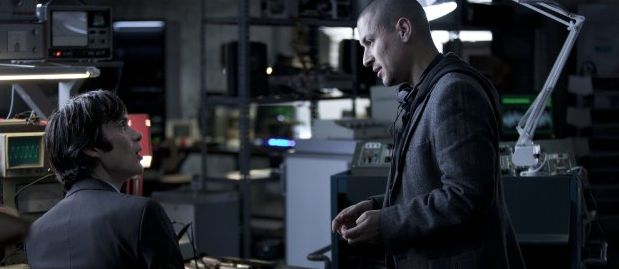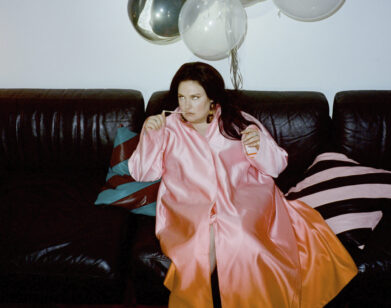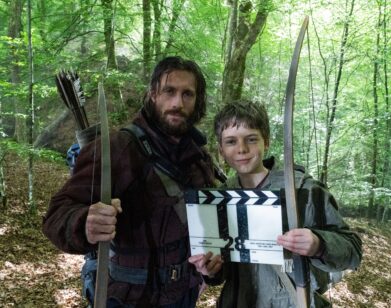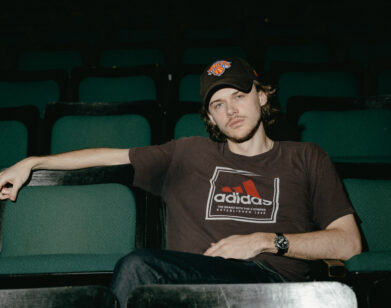Rodrigo Cortés Puts on the Red Lights

ABOVE: (LEFT TO RIGHT) CILLIAN MURPHY AND RODRIGO CORTES ON THE SET OF RED LIGHTS. PHOTO COURTESY OF MILLENNIUM ENTERTAINMENT.
You probably won’t notice all of the “red lights” in Rodrigo Cortes’ new film, Red Lights. You’ll want to rewind and re-watch it, not for entertainment, but out of a feeling of betrayal—how obvious were the clues, and how did I miss them?
A paranormal thriller, Red Lights stars Sigourney Weaver and Cillian Murphy as Margaret Matheson and Tom Buckley, a pair of university professors who spend their free time exposing self-proclaimed psychics as frauds. We’re introduced to their work when they go investigate a haunted house, but this is small potatoes. Matheson and Buckley’s real nemesis (besides gullibility at large) is Simon Silver, a telekinetic played by Robert De Niro who is back in the public eye after a 30 year absence. With an overqualified supporting cast including Elizabeth Olsen, Craig Roberts, and Joely Richardson, it is clear that someone in Hollywood believes in Cortés.
Indeed, Red Lights is only the Spanish director’s second English-language film (after 2010’s polarizing Buried) and the first for which he also wrote the screenplay. Interview sat down with Cortes to discuss unexpected endings, religion, and whether or not you can change someone else’s beliefs.
BROWN: Do you think that what Margaret and Tom are doing is important?
CORTÉS: I don’t know. Nothing is really important in the world. What’s really important? But they are doing something interesting; they are questioning things. They are skeptics, but they are not deniers. In a way they become something like [deniers] because of a certain obsession with something they wanted to explore. But debunking certain things is important, first because you question things, which is always healthy, and second because there’s a part that has to do with show biz, which is pretty harmless, but there’s another part that has to do with people’s vulnerability. That needs to be exposed.
BROWN: There are obvious parallels between the some of the psychics that Margaret and Tom are investigating, and religious figureheads. It’s sort of difficult not to equate the paranormal with religion.
CORTÉS: Yeah, but I never wanted to use religion, at least in obvious terms. The character of Matheson, who guides the philosophy, especially of the first part of the film, is not interested in believing as a concept. It’s nothing that has to do only with religion; it’s about everything. She’s interested in understanding. Something that I wanted to do through the film is try to explore the roots of belief, because everything has to do with beliefs. When I studied the side of the rationalists and the skeptics, and the side of the believers and so-called psychics, I found out that both of them, no matter what they claim to do, behave in a very similar way. They only accepted what confirmed their previous positions, and tended to reject everything that put them at risk.
Let me put it in a different way: If you believe in God, that’s a belief. If you are an atheist, it’s a belief too, because you cannot prove that God does not exist. It’s something that you have to believe in, which is something that I found pretty fascinating about the character of Matheson. I would say that that’s my way of behaving, too—it isn’t receiving, it’s not about denying. It’s about questioning, and trying to understand.
BROWN: Do you think that you can change people’s beliefs?
CORTÉS: No. Even when you expose something, when you have a true believer, that person rejects that proof; he thinks it’s just a set-up. We believe what’s more convenient for us to believe. We always behave this way. We start with the conclusion, and then we create a body of theories around it. We choose what allows us not to change.
BROWN: I read an interview with you about your last film, Buried, and you said that you thought American audiences were unhappy with the ending, because they watched movies to be rewarded and, after everything the protagonist had been through, he deserved to survive, it was only fair for the audience. Red Lights also has an unexpected ending; I felt like I had to go back and re-watch the film for clues. Are you concerned that American audiences will have a similar reaction?
CORTÉS: Yeah, I guess I’m very good at pissing people [off] with the endings. Actually, your opinion as an audience member changes several times over the film—there are some moments where you don’t know what to believe in and you start to doubt yourself and your own perception, which is actually the position I wanted everyone to feel. I love films that don’t end when they end, that go on in your head a couple of days later. And, you’re right, if you saw the movie [again]—many people see this movie twice—you’d discover certain red lights that you’ve missed the first time.
BROWN: I’ve heard you described as a “self-taught” filmmaker, is that the case?
CORTÉS: I never attended film school, so I guess I’m a self-taught director, though you have a lot of teachers—Scorsese, Kubrick, Hitchcock, Billy Wilder, and Buster Keaton. I think being self-taught is the only way of really learning things, because you have to question everybody. You don’t simply absorb axioms or so-called truths like they are rules. You have to test them, and you need to reflect on them, to consider the effect they create. So, you have very significant opinions about things, because they come out from your own reflections.
BROWN: When you’re a big fan of someone like Martin Scorsese and you have Robert De Niro, who’s worked with him so much, was it hard to sort of repress the fan in you and be like, “What’s he like?!”
CORTÉS: No, you have to repress it. You have to repress it. First, because he’s a living legend, and if you think too much of him, you die under that weight—which is the weight of the perception you have, not the weight that he imposes, because his behavior is very friendly and warm. But the position of a fan is not the one you need when you shoot. And as a director, you constantly try to solve problems, so you have to focus on that. You take away all the other parts. Of course, when the shot finishes, you remember that you have Robert De Niro in front of you. But when you’re shooting, you just see a character in front of you, and an actor, and you try to search for very truthful moments. That’s what obsesses you. So it’s not that difficult to take all those things away.
BROWN: And what are you doing next?
CORTÉS: That’s a good question. I always prefer not to talk about things that don’t exist, because they don’t exist. There are many films I would happily spend two hours with, not so many I would spend two years with. I need to be obsessed about films, because the way I work, that means two years without sleeping at all, and losing part of your life. I need to put all of my energy and heart and soul and bones and blood and skin and muscles in the things that I do. There are a couple of things that are, in the present, floating in front of my face, and once one of them gets enough energy to become a voice that I cannot not hear, then I will become a steamroller. When you’ve made your film, you stop hearing the voice.
BROWN: Isn’t it difficult to know when you should stop working on your film?
CORTÉS: Well, you know it because you stop hearing that voice. That’s why it becomes so hard to see your movie again for years, because you are, in a way, fed up.
BROWN: Do you have a similar attitude in your personal life-do you get obsessed by certain hobbies and then drop them?
CORTÉS: No, no. I guess it has to do with attention to detail. Once I do something, I need to be obsessed—or maybe I don’t need to be obsessed, but I get obsessed because that’s just the way my brain works—but I need to pay a lot of attention to detail. Because everything counts to me once I do something, even if it’s a movie that nobody cares about. That’s why I need to choose very well what I want to do. But in real life, when I watch TV or whatever, I guess I’m not that obsessive guy, and I’m pretty boring.
BROWN: That explains a lot, because every time I see an interview with one of your cast members and they’re asked about your directing style, they say you’re very intense.
CORTÉS: That’s what they say?
BROWN: Yes.
CORTÉS: Well, probably I am [laughs]. I mean, I mutter, so I guess that how people notice.
RED LIGHTS COMES OUT THIS FRIDAY, JULY 13.






